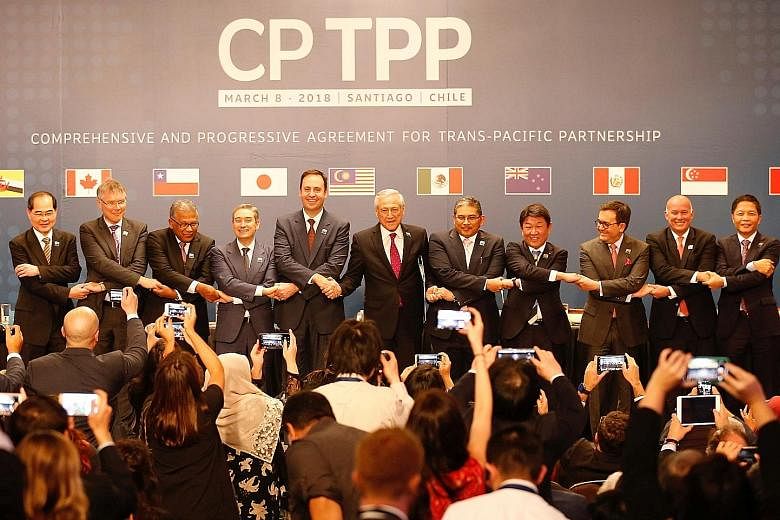Fresh from signing the revised Trans-Pacific Partnership (TPP), ministers from the newly formed trade grouping vowed to bring the agreement into force as soon as possible.
The club is also open to new members, the 11 countries in the Comprehensive and Progressive Agreement for Trans-Pacific Partnership (CPTPP) underlined.
The CPTPP was signed in Santiago, Chile on Thursday afternoon (yesterday morning Singapore time), hours before United States President Donald Trump - who pulled America out of the trade deal in January last year-signed off on steep tariffs on steel and aluminium imports.
The signing of the agreement sends a "powerful message" against trade wars, Chilean Foreign Minister Heraldo Munoz said. The agreement, he added, is a strong signal "against protectionist pressures, in favour of a world open to trade, without unilateral sanctions and without the threat of trade wars".
Minister for Trade and Industry (Trade) Lim Hng Kiang said the signing is "a concrete demonstration of the signatories' commitment to the collective goals of greater trade liberalisation, regional economic integration and better opportunities for our people." The pact, he added, sets out "a new regional standard for future free trade agreements".
Canadian Minister for International Trade Francois-Philippe Champagne said: "We're proud... to show the world that progressive trade is the way forward, that fair, balanced and principled trade is the way forward, and that putting citizens first is the way forward for the world when it comes to trade."
In a joint statement, trade ministers from all 11 CPTPP members said the agreement demonstrated their "collective commitment to an effective, rules-based and transparent trading system which is open to all economies willing to accept these principles". They welcomed the interest shown by a number of other economies wishing to join the bloc, which accounts for 13.5 per cent of the world's gross domestic product.
The 11 CPTPP members are Australia, Brunei, Canada, Chile, Japan, Malaysia, Mexico, New Zealand, Peru, Singapore and Vietnam.
Thailand and Britain have each discussed the idea of joining the trade bloc, but Britain will have to wait until it leaves the European Union. Other possible new members include Taiwan, South Korea, the Philippines and Sri Lanka, the Financial Times reported.
Mr Trump said in January that he would be open to the US rejoining the trade bloc if it could get a "substantially better deal".
CPTPP ministers said the pact promotes high standards for broader economic integration in the future.
Countries will now have to ratify the agreement, a process which involves amending their laws.
"Ministers expressed their determination to complete their domestic processes to bring the agreement into force expeditiously," said the statement.
The CPTPP will make it easier for Singapore companies to do business in the region, the Ministry of Trade and Industry (MTI) said.
The agreement will significantly eliminate tariffs and non-tariff barriers for goods. It will also allow service suppliers greater access to business opportunities in a wide range of sectors, and increase their access to government procurement contracts in other countries.
MTI added the door is open for like-minded countries to join the pact once it has entered into force - that is, after six members ratify it.
Leaders must now sell the CPTPP to their countrymen, some of whom have organised protests.
Activists in New Zealand protested against clauses that would allow foreign firms to sue the government for unfair breaches of contract, arguing this was tantamount to selling the country's sovereignty. But New Zealand signed letters with five nations which agreed not to sue, and Trade Minister David Parker said the pact was a "fair deal" for the nation.
Singapore will need to make legislative amendments to meet its CPTPP obligations, Mr Lim said last week. "The CPTPP members intend to try and achieve ratification before the end of the year, so Singapore will also strive to do that."



